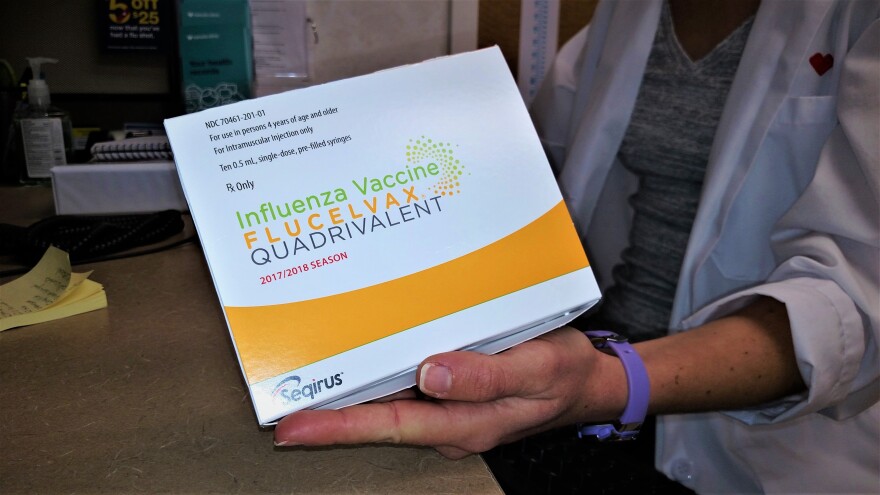As the 2017 calendar year drew to a close, flu activity levels in Florida continued to increase sharply for the fourth week in a row, including a spike locally. For public health officials, it’s a good time to remind residents to protect themselves from the flu by getting vaccinated.
“This is the vaccination information sheet on the flu vaccine if you have any questions about it,” said the physician’s assistant working at the MinuteClinic inside the CVS Pharmacy in Milton.
I stopped there Wednesday afternoon to get my own flu shot.
“So you’ll get the seasonal influenza vaccine,” she says showing me the package.
After a couple of questions, including one about which arm to use for the shot, the PA rounded up the supplies and in just a few short minutes, it was over.

“That was it,” she declares.
That was it; painless and quick.
I was prompted to go ahead and get a flu shot, after learning of a reported increase in flu cases in Santa Rosa County over the holidays.
"So the latest date we have is up until the end of the year, so up until the new year, um, week 52,” said Erik Rappa, an epidemiologist with the Florida Department of Health in Santa Rosa.
“Here it spiked, our sharpest increase that we’ve actually had. So that’s kind of what the alert was, kind of to get people to understand is that we just had our sharpest increase and it looks like it’s (going to) keep going up from there.”
Reports from the Emergency Department at Santa Rosa Medical Center show visits due to influenza-like illnesses (ILI) increased to 7.4 percent, 10.6 percent and 10.8 percent for each of the three days (Dec. 26, 27, 28) following Christmas.

That’s after an overall increase of less than three percent for the first 25 days of December.
Rappa adds the numbers could be worse, and in reality probably are, if you consider the reporting data for this same period from last flu season.
“Even though 2016-17 does have the highest numbers, those were actually numbers we gathered from all three – Gulf Breeze Hospital, Jay Hospital, and Santa Rosa Medical Center,” Rappa said, point out that this season’s increase reflects only numbers from the medical center. “The numbers in actuality are going to be higher because we don’t have that report from those other two hospitals.”
Since most strains of influenza are not required to be reported, it’s hard to know the real number of cases. But, according to the state Department of Health, there have been more outbreaks reported so far this season than in previous seasons at this time, which may be an indication of a more severe flu season. Like Santa Rosa, there’s been an increasing trend in Escambia and Okaloosa counties, with sharp increases in activity reported in all regions of the state, across all age groups.
As with Santa Rosa, data retrieved from the Electronic Surveillance System for the Early Notification of Community-based Epidemics (ESSENCE) showed significant increases in the number of flu-related ER visits in Escambia and Okaloosa counties in Week 52.
DOH-Escambia reported 202 such cases, compared to 116 cases during the same timeframe of the 2016-2017 season. DOH-Okaloosa reported 156 ER visits for flu-like illnesses, compared to just 97 during Week 52, 2016.
The flu season typically runs from early October (about week 40) through mid-May (week 20) of the following calendar year, with this season’s peak projected for late January or early February.
Sherry Worley, epidemiology nurse at DOH-Santa Rosa, says there is still time for prevention measures.
“Absolutely, it is never too late to get a flu shot,” said Worley. “We urge people who haven’t had their flu shot to go ahead and get that flu shot. It takes about 2 weeks to become active in your body, so go get it now.”
The Centers for Disease Control & Prevention (CDC) recommends flu shots for anyone six months of age or older, with high risk groups to include children under five, adults over the age of 65, pregnant women and those with health issues such as asthma, AIDS, cancer, and diabetes.

DOH-Santa Rosa now has a limited supply of free vaccine available for children six months through 18 years of age, and adults can get the shot for a nominal charge.
Although it’s not 100 percent guaranteed, Worley says those who get vaccinated should be protected from the various strains.
“This year’s flu vaccine has an A-Michigan; A-Hong Kong, and B-Brisbane. And, then there’s a quadrivalent, another vaccine that also has another B (virus) added to it,” said Worley noting the work of the CDC to project what strain of the virus is going to be predominant each year in order to determine what to put in the vaccine.
Individuals also can reduce their risk of getting the flu with frequent hand washing, covering their nose and mouth with a disposable tissue when coughing or sneezing, and staying home if ill with flu-like symptoms.
But, the best defense against the flu is the vaccination, which is available at any local county health department office, local pharmacies, and some doctor’s offices.
With all those options, it should be relatively easy to increase the number of people who receive flu shots each year.
“Historically in Florida, it’s been around 40 percent,” Worley said, adding that that leaves a lot of room for improvement. “As a public health official, no, I don’t think anything is good, unless it’s closer to the 90-100 percent mark,” she chuckled.
More information on the 2017-2018 flu season is available on the CDC website.






